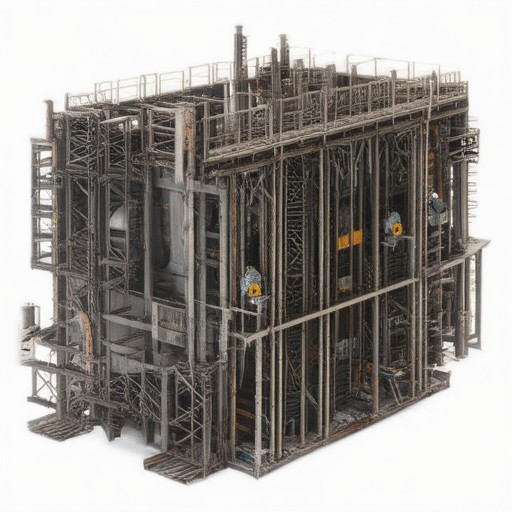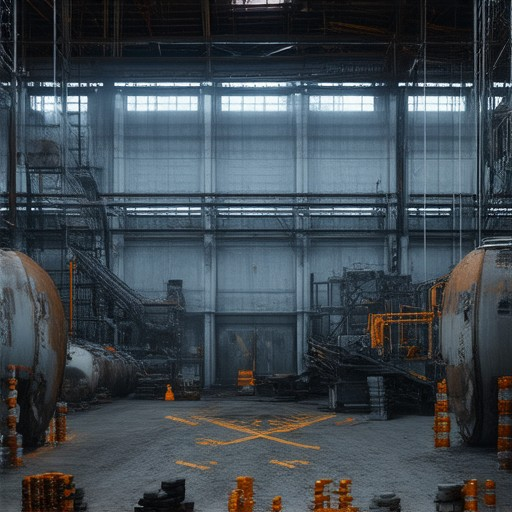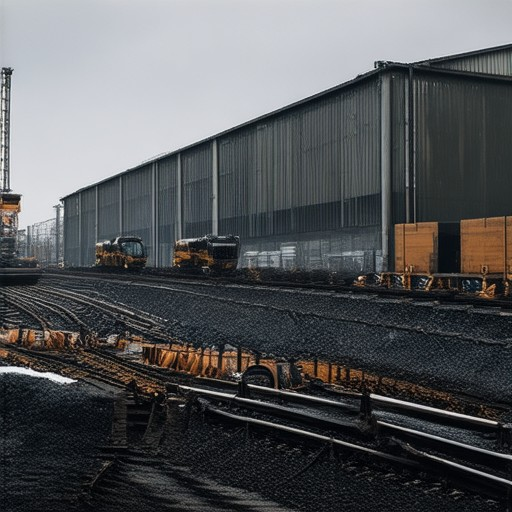Steel wheels are indispensable in heavy-duty applications, offering unparalleled strength and durability to handle demanding tasks across industries. Whether it’s for trucks, construction equipment, or industrial machinery, high-quality steel wheels are essential for optimizing performance and ensuring long-term reliability. Designed to withstand rigorous use, these wheels excel in load-bearing capacities, often supporting weights ranging from 2,000 lbs up to 10,000 lbs or more, making them a cornerstone in heavy-duty operations. While some may question the cost-effectiveness of steel wheels compared to alternatives, their benefits in terms of longevity and efficiency often justify the investment. This guide explores the key features, material differences, and top manufacturers, providing insights into why steel wheels remain a preferred choice for heavy-duty applications. Additionally, we’ll delve into the advantages of OEM steel wheels, offering a comprehensive overview to help users make informed decisions.
Key Takeaways
– Top Manufacturers: Nitro Manufacturing, KMC Wheels, and Incubus Wheels lead in strength, performance, and style for steel wheels.
– Affordability Factors: Steel wheels are cost-effective due to lower material costs, simple manufacturing, economies of scale, repair ease, and competitive pricing.
– OEM Excellence: OEM steel wheels are precision-engineered for optimal fit, durability, and performance, ideal for vehicles requiring reliability and authenticity.
– Choosing OEM: Opt for OEM wheels if you prioritize factory-quality, precise fitment, and a classic appearance over aftermarket alternatives.

How Much Weight Can a Steel Wheel Hold?
A steel wheel’s weight capacity depends on its type and application. Forged steel wheels, known for their exceptional durability, typically have a weight capacity ranging from 1400 to 23,000 pounds, as seen in products like those from Hamilton Caster. These wheels are designed to handle heavy loads commonly found in industrial and commercial settings.
Cast steel wheels, while less expensive, generally have a lower weight capacity compared to forged options. Their strength varies depending on the specific design and manufacturing process.
When considering the weight a steel wheel can hold, factors such as the wheel’s size, intended application, and load distribution play a crucial role. Overloading a wheel beyond its recommended limit can lead to mechanical failure and safety hazards.
For optimal performance, always adhere to manufacturer guidelines and ensure proper load distribution to maximize safety and longevity.
Competitors
Incubus Wheels offers a range of custom solutions tailored for various applications, emphasizing durability and performance. While we focus on Hamilton Caster products, Incubus Wheels provides comparable quality and versatility in different contexts. Visit their official website for more details: Incubus Wheels .
When selecting a steel wheel, prioritize the specific demands of your application to ensure you choose the right product for your needs.
- Steel wheels are significantly heavier than aluminum wheels, increasing the vehicle’s overall weight. This excess weight contributes to increased unsprung mass, which can negatively impact driving performance, including acceleration, braking, and handling.
- Maintenance requirements are higher due to the risk of rust and corrosion, especially in environments with moisture or salt. Regular treatment to prevent rusting may be necessary, adding to maintenance costs and effort.
- Durability can be a concern as steel wheels are more susceptible to dents and scratches compared to lighter materials like aluminum. This can lead to frequent repairs or replacements over time.
- While steel wheels are often cheaper upfront, their additional weight and maintenance needs can result in higher overall costs in the long term.
- Corrosion is a significant issue for steel wheels, particularly in wet or salty environments. Over time, this can weaken the structural integrity of the wheels and reduce their lifespan.
- Environmental impact is another consideration, as steel production has a higher carbon footprint compared to aluminum. However, steel can be recycled, which helps mitigate this issue to some extent.

Which is Stronger: Aluminum or Steel Wheels?
When comparing the strength of aluminum and steel wheels, several factors come into play, including material properties, construction, and intended use.
- Durability: Steel wheels are generally considered stronger due to their higher tensile strength and ability to withstand impact and stress. They are often used in industrial and off-road applications where durability is paramount.
- Weight: Aluminum wheels are lighter, which can be advantageous in applications where weight reduction is critical, such as in racing vehicles or bicycles. However, this lightness doesn’t inherently mean they are weaker; aluminum is actually quite strong for its weight.
- Application-Specific Design: The choice between steel and aluminum wheels largely depends on the intended use. Steel wheels are preferred for their strength in heavy-duty scenarios, while aluminum wheels are chosen for their lightweight properties in performance-oriented vehicles.
- Cost: Steel wheels are typically more affordable, making them a popular choice for many applications. Aluminum wheels, while more expensive, may offer better corrosion resistance and a wider range of finishes and designs.
In summary, while aluminum wheels offer lightweight advantages, steel wheels are generally stronger and more durable for most applications. However, in contexts where weight is a critical factor, aluminum wheels may be preferred despite their lower raw strength.

Who Makes the Best Steel Wheels?
When evaluating who makes the best steel wheels, several manufacturers stand out for their quality, durability, and innovation. Here’s a breakdown of leading brands:
- Nitro Manufacturing – Renowned for their precision forging process, Nitro Manufacturing produces some of the strongest and most durable steel wheels available. Their wheels are widely recommended for both on-road and off-road applications.
- KMC Wheels – Known for their innovative design and high-performance steel wheels, KMC Wheels is a favorite among racers and off-road enthusiasts. Their wheels feature advanced beadlock technology and are built to handle extreme conditions.
- Incubus Wheels – Specializing in custom and modular wheels, Incubus Wheels offers a wide range of styles and finishes. Their wheels are popular among car enthusiasts looking for a unique aesthetic while maintaining strength and performance.
Each of these brands excels in different aspects:
- Nitro Manufacturing focuses on strength and longevity, making them ideal for heavy-duty applications.
- KMC Wheels prioritizes lightweight construction and race-ready performance.
- Incubus Wheels combines style with durability, offering customizable options for personalization.
Whether you’re looking for versatility, performance, or aesthetics, these top manufacturers deliver exceptional quality and reliability. Consider your specific needs and preferences when choosing the right steel wheels for your vehicle.
Why Are Steel Wheels So Cheap?
Steel wheels are often considered more economical compared to other types of wheels due to several factors:
- Material Cost : Steel is typically more cost-effective than premium alloys used in alloy wheels. The production of steel is more straightforward, leading to lower initial material costs.
- Manufacturing Process : The manufacturing process for steel wheels is generally simpler, requiring fewer specialized techniques and materials, thus reducing production costs.
- Economies of Scale : Steel wheels are produced in large quantities, which allows manufacturers to benefit from economies of scale, lowering the average cost per unit.
- Repair and Maintenance : Steel wheels are often easier and cheaper to repair. Minor damages can be fixed without specialized tools or costly parts, extending their usability.
- Market Competition : There is significant competition among manufacturers producing steel wheels, which can drive prices down and increase accessibility for consumers.
- Durability vs. Cost Balance : While steel wheels may not offer the same longevity as alloy wheels, they provide a balance between cost and performance, making them a practical choice for many applications.
These factors contribute to the affordability of steel wheels, making them a popular option for vehicles and equipment where cost-effectiveness is crucial.

What Are OEM Steel Wheels?
OEM stands for Original Equipment Manufacturer. OEM steel wheels are specifically designed and manufactured by the vehicle’s manufacturer for use in production models. These wheels are tailored to meet exact specifications, ensuring optimal performance, safety, and fitment for the intended vehicle.
Key Characteristics of OEM Steel Wheels:
- Precision Engineering: Built to precise specifications, OEM wheels ensure consistent quality and performance.
- Durability: Engineered for long-lasting wear, OEM wheels withstand harsh conditions and stress.
- Compatibility: Designed exclusively for specific vehicle models, OEM wheels provide perfect fitment and functionality.
- Aesthetics: Many drivers appreciate the factory-original look and finish of OEM wheels.
Comparison to Aftermarket Wheels:
OEM wheels differ from aftermarket wheels in several ways. While aftermarket options often offer customization and potential cost savings, OEM wheels are optimized for reliability and direct vehicle integration. However, aftermarket wheels may provide additional features or styles not available through OEM options.
When to Choose OEM Wheels:
- If you prioritize factory-quality and performance.
- For vehicles requiring precise fitment and functionality.
- When seeking a classic or stock appearance.
Example: Vehicle-Specific Benefits
Consider a popular sedan produced by a major manufacturer. The OEM wheels for this model are precisely calibrated to handle the vehicle’s weight distribution, suspension setup, and braking systems. This ensures optimal handling characteristics and longevity.
By choosing OEM steel wheels, you invest in a solution that aligns with your vehicle’s design and performance needs, offering peace of mind and reliability on the road.
Conclusion:
OEM steel wheels are a wise choice for drivers who value precision, durability, and authenticity. They are crafted specifically for your vehicle, ensuring a perfect fit and optimal performance. Consider OEM wheels when seeking a reliable and stylish option for your ride.




0 Comments